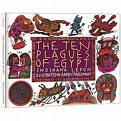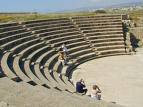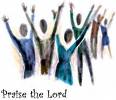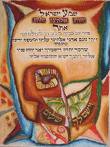
| Next | Previous | Index | Tellout Home |
55. Seven Last Plagues
Revelation 15.1-4
"I saw in heaven another great sign, seven angels with the seven last plagues. With them, God completes his wrath. And I saw what looked like a glowing fiery glass sea. Standing beside the sea were those victorious over the beast, its image, and the number of its name. They held harps received from God and sang God's servant Moses and the Lamb's song. 'Great are your deeds, Lord God Almighty. Just and true are your ways, nations' king. Who will not fear you and bring your name glory, Lord? For you alone are holy. All nations will come and worship before you, for you have revealed your righteous acts.'" (Revelation 15.1-4) ✞
Armageddon
 John of Patmos tells of the pouring out of the seven last plagues in Revelation 16.1-21, concluding this section on God's wrath. "Then I heard a loud voice from the temple saying to the seven angels, 'Go, pour out the seven bowls of God's wrath on the earth.'" These afflictions cause terrible sores on those with "the beast's mark who worshiped his image." When this second bowl pours out, the sea becomes blood, resulting in all the sea's life dying. The third angel's bowl turns all rivers and springs to blood. The fourth bowl causes the sun to become so hot as "to scorch people," and they curse God. ✞
John of Patmos tells of the pouring out of the seven last plagues in Revelation 16.1-21, concluding this section on God's wrath. "Then I heard a loud voice from the temple saying to the seven angels, 'Go, pour out the seven bowls of God's wrath on the earth.'" These afflictions cause terrible sores on those with "the beast's mark who worshiped his image." When this second bowl pours out, the sea becomes blood, resulting in all the sea's life dying. The third angel's bowl turns all rivers and springs to blood. The fourth bowl causes the sun to become so hot as "to scorch people," and they curse God. ✞
Fifth Plague
 The fifth plague causes complete darkness, but they refuse to repent. The sixth bowl pours on the River Euphrates. The river will dry up so that armies can travel to Armageddon's great battle only 18 miles southeast of modern Haifa. From this location, the assembled troops can advance towards Jerusalem for a final battle against Jesus Christ. The seventh and last plague is "thundering, lightning flashes and a mighty earthquake." Jesus' followers would be greatly encouraged, but it would, undoubtedly, bring profound misery to others. John of Patmos' arrangement in two sets of seven numbers is typical of how the apocalyptic writers arranged ten, seven, or three groups. Two groups of seven would approach perfection. ✞
The fifth plague causes complete darkness, but they refuse to repent. The sixth bowl pours on the River Euphrates. The river will dry up so that armies can travel to Armageddon's great battle only 18 miles southeast of modern Haifa. From this location, the assembled troops can advance towards Jerusalem for a final battle against Jesus Christ. The seventh and last plague is "thundering, lightning flashes and a mighty earthquake." Jesus' followers would be greatly encouraged, but it would, undoubtedly, bring profound misery to others. John of Patmos' arrangement in two sets of seven numbers is typical of how the apocalyptic writers arranged ten, seven, or three groups. Two groups of seven would approach perfection. ✞
Lake of Fire
 Before John of Patmos describes the seven angels with the seven last plagues, he paints a picture of those martyred for Christ. They stand beside the glowing fiery glass seas. Artisans made glass into jewelry, beads, window panes, and tableware, rare and precious in antiquity. So it appears here intermingled with fire. In Scripture, fire and burning are judgment symbols. So the fire of judgment light, which descends on the earth, illuminates the whole scene. ✞
Before John of Patmos describes the seven angels with the seven last plagues, he paints a picture of those martyred for Christ. They stand beside the glowing fiery glass seas. Artisans made glass into jewelry, beads, window panes, and tableware, rare and precious in antiquity. So it appears here intermingled with fire. In Scripture, fire and burning are judgment symbols. So the fire of judgment light, which descends on the earth, illuminates the whole scene. ✞
Moses' Servant Song
 God gives the heavenly martyrs harps to sing Moses' servant song, joining the Lamb's music. The "nations' king" or the "Ages' King" emphasizes Jesus' geographical control and eternal power. Phrases in Moses' servant song come from Psalm 111.2-3 "Great are the Lord's works. They are pondered by all who delight in them. Glorious and majestic are his deeds, and his righteousness endures forever." Jeremiah 10.7 adds, "Who should not fear you, the nations' king? Among all the nations' wise leaders and in all their kingdoms, there is no one like you." Psalm 86.9 explains, "All your created nations will come and worship before you, Lord. They will glorify your name." Finally, Psalm 98.2 concludes, "The Lord has made his salvation known and revealed his righteousness to the nations." ✞
God gives the heavenly martyrs harps to sing Moses' servant song, joining the Lamb's music. The "nations' king" or the "Ages' King" emphasizes Jesus' geographical control and eternal power. Phrases in Moses' servant song come from Psalm 111.2-3 "Great are the Lord's works. They are pondered by all who delight in them. Glorious and majestic are his deeds, and his righteousness endures forever." Jeremiah 10.7 adds, "Who should not fear you, the nations' king? Among all the nations' wise leaders and in all their kingdoms, there is no one like you." Psalm 86.9 explains, "All your created nations will come and worship before you, Lord. They will glorify your name." Finally, Psalm 98.2 concludes, "The Lord has made his salvation known and revealed his righteousness to the nations." ✞
Miriam's Song
 Moses' sister Miriam also sang and danced the Lord's praise song after the people of Israel had triumphantly crossed the Red Sea. The English Biblical scholar H. B. Swete (1835-1917) commented, "The saints have now come safely through the martyrdom sea and have arrived at heaven's shore." There, they sing Moses' song and dance with joy. Heaven's martyrs emerge victorious from their contest with evil forces and the Antichrist. They often died the most savage deaths, and yet they emerge here triumphant." It is the very fact that they died that makes them victors. If they remained alive by denying their faith, their enemies defeated them. ✞
Moses' sister Miriam also sang and danced the Lord's praise song after the people of Israel had triumphantly crossed the Red Sea. The English Biblical scholar H. B. Swete (1835-1917) commented, "The saints have now come safely through the martyrdom sea and have arrived at heaven's shore." There, they sing Moses' song and dance with joy. Heaven's martyrs emerge victorious from their contest with evil forces and the Antichrist. They often died the most savage deaths, and yet they emerge here triumphant." It is the very fact that they died that makes them victors. If they remained alive by denying their faith, their enemies defeated them. ✞
Victory Day
 Again and again, the Early Church records describe a martyrdom day as a victory day. On such a day, faithful Christians process to the martyr's tomb and worship God there. In "The Martyrdom of Saint Perpetua," we read from a young woman's prison diary martyred in Carthage in 202-203 AD. "The victory day dawned, and they walked from prison to the amphitheater as if they were walking to heaven, happy and serene in countenance." Jesus says in Matthew 16.25, "For whoever wants to save their life will lose it, but whoever loses their life for me will find it." The Greek phrase "save their life" can mean "save their soul." The real victory is not to prudently preserve life but to face the worst that evil can do and, if need be, to be faithful in death. A famous Spanish poet, philosopher, and mystic named Miguel de Unamuno y Jugo (1864-1936) once said, "May God deny you peace, and give you glory." ✞
Again and again, the Early Church records describe a martyrdom day as a victory day. On such a day, faithful Christians process to the martyr's tomb and worship God there. In "The Martyrdom of Saint Perpetua," we read from a young woman's prison diary martyred in Carthage in 202-203 AD. "The victory day dawned, and they walked from prison to the amphitheater as if they were walking to heaven, happy and serene in countenance." Jesus says in Matthew 16.25, "For whoever wants to save their life will lose it, but whoever loses their life for me will find it." The Greek phrase "save their life" can mean "save their soul." The real victory is not to prudently preserve life but to face the worst that evil can do and, if need be, to be faithful in death. A famous Spanish poet, philosopher, and mystic named Miguel de Unamuno y Jugo (1864-1936) once said, "May God deny you peace, and give you glory." ✞
Singing the Lord's Song
 Revelation's victorious martyrs sing the Lord's song. "Great and marvelous are your deeds, Lord God Almighty." The Lamb's music is the redeemed ones' song that only martyrs can learn. They also sing Moses' and Miriam's songs after the Red Sea's crossing. "The Lord is my strength and song and become my salvation. Who is like you among the gods, Lord? Who is like you, majestic in holiness, awesome in glory, working wonders? The Lord reigns forever and ever." The phrase, "the Lord is my strength, and my song," also may mean "the Lord is my strength and defense." Our song is also our defense! ✞
Revelation's victorious martyrs sing the Lord's song. "Great and marvelous are your deeds, Lord God Almighty." The Lamb's music is the redeemed ones' song that only martyrs can learn. They also sing Moses' and Miriam's songs after the Red Sea's crossing. "The Lord is my strength and song and become my salvation. Who is like you among the gods, Lord? Who is like you, majestic in holiness, awesome in glory, working wonders? The Lord reigns forever and ever." The phrase, "the Lord is my strength, and my song," also may mean "the Lord is my strength and defense." Our song is also our defense! ✞
The Shema
 At each Sabbath evening synagogue service, every Jew has the Lord's song memory stamped upon them. They recite the "Shema," Israel's creed, and follow it with two prayers. One prayer says, "The delivered sang a new song to your name by the sea-shore, all praised together and owned you king, and said, 'Jehovah shall reign, world without end. Blessed be the Lord who saves Israel.'" Moses' song commemorates God's people's most extraordinary deliverance. The victorious martyrs are brought through the persecution' seas to sing a new song to the Lord in heaven's promised land. ✞
At each Sabbath evening synagogue service, every Jew has the Lord's song memory stamped upon them. They recite the "Shema," Israel's creed, and follow it with two prayers. One prayer says, "The delivered sang a new song to your name by the sea-shore, all praised together and owned you king, and said, 'Jehovah shall reign, world without end. Blessed be the Lord who saves Israel.'" Moses' song commemorates God's people's most extraordinary deliverance. The victorious martyrs are brought through the persecution' seas to sing a new song to the Lord in heaven's promised land. ✞
Martyrs' Song
 Revelation's victorious ones sing their own martyr's song to the Lord and Ages' King and praise God's greatness. "Ages' King" or "Nations' King" emphasizes God's eternal nature and omnipotence. The martyrs' song is almost entirely composed of Old Testament quotations. There is not one word about their achievements but a lyrical outburst of praise for God's greatness. "It is true that you are our God Jehovah, and our fathers' God, our king, and fathers' king, our savior, and our fathers' savior, creator, salvation rock, help, and deliverer. Your name is everlasting, and there is no God besides you." "Great are your deeds, Lord God Almighty. Your ways, Ages' King, are fair and true. Who will not fear you, O Lord, and glorify your name? For you alone are holy. All nations will come and worship before you, for God has revealed your righteous acts." ✞
Revelation's victorious ones sing their own martyr's song to the Lord and Ages' King and praise God's greatness. "Ages' King" or "Nations' King" emphasizes God's eternal nature and omnipotence. The martyrs' song is almost entirely composed of Old Testament quotations. There is not one word about their achievements but a lyrical outburst of praise for God's greatness. "It is true that you are our God Jehovah, and our fathers' God, our king, and fathers' king, our savior, and our fathers' savior, creator, salvation rock, help, and deliverer. Your name is everlasting, and there is no God besides you." "Great are your deeds, Lord God Almighty. Your ways, Ages' King, are fair and true. Who will not fear you, O Lord, and glorify your name? For you alone are holy. All nations will come and worship before you, for God has revealed your righteous acts." ✞
Ages' King
 The name of the great and just true king is worshipped by believers and heaven's angels, as they praise, so people forget themselves. Heaven is a place where people remember only the Lamb of God and the Heavenly Father. The Irish Biblical scholar R. H. Charles (1855-1931) believed, "In the perfect vision of God, one wholly forgets self." When we become absorbed in God's wonder, we completely forget our petty needs. A fellow commentator on Revelation, H. B. Swete (1835-1917), agreed, "In God's presence, the martyrs forget themselves. New wonders surrounding them absorb their thoughts. The just true king and the mighty scheme of things, in which their sufferings form a tiny, infinitesimal part, are opening before them. They begin to see the great world drama, and we hear the doxology with which they greet their first unclouded vision of the true king and his works." ✞
The name of the great and just true king is worshipped by believers and heaven's angels, as they praise, so people forget themselves. Heaven is a place where people remember only the Lamb of God and the Heavenly Father. The Irish Biblical scholar R. H. Charles (1855-1931) believed, "In the perfect vision of God, one wholly forgets self." When we become absorbed in God's wonder, we completely forget our petty needs. A fellow commentator on Revelation, H. B. Swete (1835-1917), agreed, "In God's presence, the martyrs forget themselves. New wonders surrounding them absorb their thoughts. The just true king and the mighty scheme of things, in which their sufferings form a tiny, infinitesimal part, are opening before them. They begin to see the great world drama, and we hear the doxology with which they greet their first unclouded vision of the true king and his works." ✞
Justice and Holiness
 For the martyrs, justice, and holiness join together like the links of a chain. Revelation 15.3b repeats, "Just and true are your ways, Ages' King." Having this kind of king means that truth is prominent. His perfect justice matches his supreme righteousness and purity. He is scrupulously fair in his judgment because his holy standards are so clear. Unfortunately, today's church tiptoes around in our politically correct society and often calls for justice without reference to purity and truth. It is later surprised that no justice appears in the absence of holiness and honesty! ✞
For the martyrs, justice, and holiness join together like the links of a chain. Revelation 15.3b repeats, "Just and true are your ways, Ages' King." Having this kind of king means that truth is prominent. His perfect justice matches his supreme righteousness and purity. He is scrupulously fair in his judgment because his holy standards are so clear. Unfortunately, today's church tiptoes around in our politically correct society and often calls for justice without reference to purity and truth. It is later surprised that no justice appears in the absence of holiness and honesty! ✞
"Seven Last Plagues"
by Ron Meacock © 2021
| ^Top Page | Next | Previous |